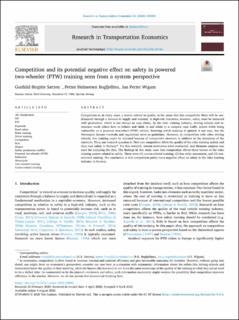Competition and its potential negative effect on safety in powered two-wheeler (PTW) training seen from a system perspective
Peer reviewed, Journal article
Published version
Permanent lenke
https://hdl.handle.net/11250/2679239Utgivelsesdato
2020Metadata
Vis full innførselSamlinger
Originalversjon
Sætren, G. B., Bogfjellmo, P. H. & Wigum, J. P. (2020). Competition and its potential negative effect on safety in powered two-wheeler (PTW) training seen from a system perspective. Research in Transportation Economics, 82: 100881. doi: 10.1016/j.retrec.2020.100881Sammendrag
Competition is, in many ways, a source related to quality in the sense that less competitive firms will be outdistanced through a balance in supply and demand. In high-risk industries, however, safety must be balanced with production, which is not always an easy choice. In the rider training industry, driving schools and instructors teach others how to behave and think in and relate to a complex road traffic system while being vulnerable on a powered two-wheel (PTW) vehicle. Knowing which training is optimal is not easy, but the Norwegian learner curricula and regulations serve as guidelines. However, in competition with other driving schools, this training might be adjusted because of competitive elements in addition to the intentions of the curricula. Thus, our research question is ‘How can competition affect the quality of the rider training system and thus road safety in Norway?’ For this research, sixteen interviews were conducted, and thematic analysis was used for analysing the data. The findings in this study were that competition affects three factors of the rider training system related to safety. These were (1) course-related training, (2) less strict assessment, and (3) testoriented training. The conclusion is that competition partly has a negative effect on safety in the rider training industry in Norway.

